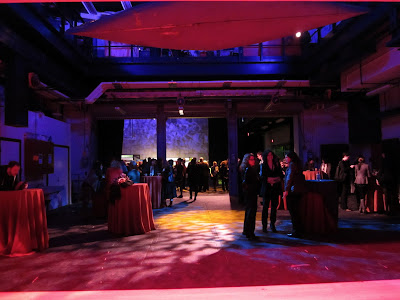Innocents and Others/Dana Spiotta: She'll leave you exhilarated
Sunday, February 26, 2017
You can't blame me, though, for confessing that my affection for Spiotta deepened as I learned more about her from my son. She's just really great, he'd say, repeatedly. She just makes stories fun. Saunders was fun. Critiques were fun. Spiotta's workshops were fun. I'd spent much of my motherhood hoping my son would make room for my kind of literature. And there was Dana Spiotta, liberating that kind of love.
Readers of this blog know that, in 2011, I declared Spiotta's Stone Arabia the book of that year, and that by many other estimations, I was right. Those who happened to be at a certain Phillip Lopate reading at Bryn Mawr College last year heard me gasp when Dan Torday (who managed to write this novel while creating and managing this exceptional series) announced that Dana Spiotta would be a Bryn Mawr guest in February 2017.
(Novella artist Cyndi Reeves was there. She heard me gasp.)
Given the history, you'd think I'd have been prepared for the Dana Spiotta I did in fact meet last Wednesday, but I was not remotely prepared. For her easy embrace of near strangers. For her willingness to confide about structure, process, economy, the pursuits of her immense intelligence. For her enormously endearing magic trick of not behaving like the most important person in the room.
Sure, as Spiotta noted during her time at Bryn Mawr, we all curate ourselves, whittle ourselves into the moment. But there's no faking Spiotta's brand of deep-leaning generosity.
Nor is there any denying the almost giddy power of Innocents and Others, Spiotta's newest novel. Recently nominated for the LA Book Prize, Innocents is a profound miracle—a mash up of artifactual nerdiness, filmic obsession, and unforeseen but somehow perfectly logical collisions of characters and ideas. I have no desire to try to describe this book, because the point is: it must be experienced. It must be yielded to on a cold winter day, when it's only you, the couch, the book, and a blanket. Ambition and fabules, listening and seeing, isolation and enduring friendships—you'll find it all here, alongside the arcane and the pop. You'll find riffs (and they don't for one second interfere with the novel's pacing) on rare facts of real life like body listening. This is a section taken from early in the book, from the POV of a woman who calls herself Jelly. Jelly practices the art of phone seduction:
It was when you surrendered to a piece of music or a story. By reclining and closing your eyes, you could respond without tracking your response. You listened. The opposite were the people who started to speak the second someone finished talking or playing or singing. They practically overlapped the person because they were so excited to render their thoughts into speech. They couldn't wait to get their words into it and make it theirs. They couldn't stand the idea of not having a part in it. They spent the whole experience formulating their response, because their response is the only thing they value.Here, later on in the book, are thoughts about being an artist:
It is partly a confidence game. And partly magic. But to make something you also need to be a gleaner. What is a gleaner? Well, it is a nice word for a thief, except you take what no one wants. Not just unusual ideas or things. You look closely at the familiar to discover what everyone else overlooks or ignores or discards.My friend Thomas Devaney was at the reading last Wednesday night. He had Spiotta's novel in his hand, but no words for it. It's just that good. It's just that wise. There's no actual point in talking about it.
Buy it, please, and read.
Read more...






























